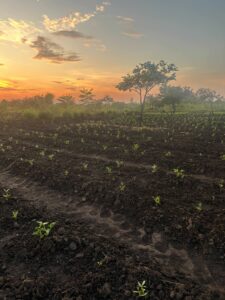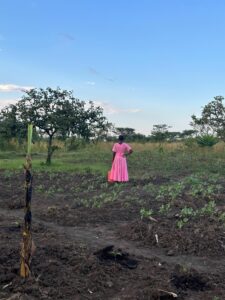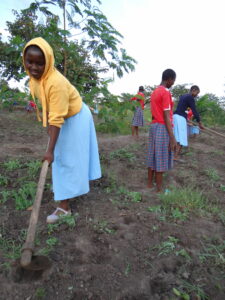The answers to many of the world’s greatest challenges may be growing in farms like this one in Tanzania
In remote northwest Tanzania, there’s a small plot of land that just might be growing the future — and not solely because of what’s in the soil.
The Garden for the Future is a three-way permaculture partnership between three nonprofits: Immaculate Heart Sisters of Africa (which founded the Kitenga Girls Secondary School); Mainsprings, which oversees a Tanzanian permaculture center; and our organization, Girls Education Collaborative (GEC). Our Garden is not only providing young women and girls with food security and healthy food options while helping to restore climate stability, but is also teaching them invaluable skills. At scale, this model can have a major impact on the planet.
In 2024, global thought leadership is bookended by two major annual events: the World Economic Forum (a.k.a. Davos), which took place just last month, and the UN General Assembly (a.k.a. UNGA) in September, which this year will be punctuated by a special convening called the Summit of the Future.
The theme of the Davos convening this year was rebuilding trust while the main thrust of the UN’s September Summit — which is being billed as a “once-in-a-generation opportunity to enhance cooperation on critical challenges and move toward a reinvigorated multilateral system that is better positioned to positively impact people’s lives” — is paving a future for the planet that is both cooperative and smart.
That is precisely what GEC is doing in Tanzania.
Garden for the Future is growing solutions to some of the most pressing problems the world faces today. Permaculture — a form of agriculture that works with nature and regenerates the land in a way that supports people, animals, and the planet — is a more sustainable approach to farming than today’s prevalent, extractive practices, one that encourages a holistic, ecologically-conscious lifestyle. Garden for the Future is embracing the principles of Permaculture and its guiding ethos: people care, planet care, future care.
Making Agriculture Sexy
In so many ways, Garden for the Future is a living lab that offers answers to questions about health and nutrition, of course, but also about climate change, gender equality, economic opportunity, and education.

Kitenga students working the farm will learn first-hand about the strategies and purpose behind Permaculture and witness the results and shorter-term impacts, such as:
- healthier and more varied food — at a lower cost
- crops less vulnerable to the negative impacts of climate change, such as unpredictable weather
- conservation of water, and
- restoration of the environment.
They will also come to understand the longer-term impacts, such as:
- sequestering of carbon
- repair and saving of topsoil
- mitigating the pace of climate change
And societally, they (and staff and community members) will potentially be inspired to change their approach to agriculture and hence make collective impact in environmental restoration and mitigating climate change.
Then there are the local factors that, in addition to the above issues, further impact the impoverished region of northern Tanzania where GEC operates. One difficult challenge to overcome there is a societal-perception issue: that agricultural work is for uneducated girls or for older women — not for the next generation of educated Tanzanian young women. Educationally, the Garden for the Future will help train young women for critical, future-forward jobs that will play a vital role in determining the planet’s future — and Africa’s future food security.
The girl students can also take these skills back to their own lives, changing an extractive agriculture approach to a regenerative one.

By reimagining this sector as one that offers cutting-edge answers to challenges related to food security, economic opportunity, education, gender equality, and the climate crisis, the Garden for the Future can make agriculture sexy.
In short, Garden for the Future will seed, as it were, the next generation of farmers. The pilot program is introducing adolescent African girls to the power and potential of permaculture to nurture their bodies, improve human health, and restore the planet.
Anne Robinson Wadsworth is the founder and Executive Director of Girls Education Collaborative.
